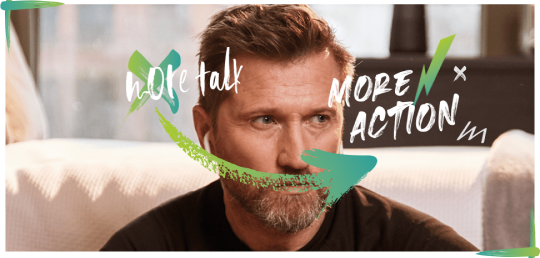
What to say to a friend struggling with mental health problems

Men are three times more likely to die by suicide than women in the UK (BBC). It’s clear we need to talk more about how we’re feeling.
It’s a dark and difficult subject to broach – so naturally many people don’t know what to say when a friend who opens up.
We know firsthand how important it is to talk
Banish founders Jamie and Tommy have first hand experience of this with Jamie suffering from mental health issues all of his life. He was diagnosed with ADHD and mild Autism as a child, which affected him throughout his career.
When Jamie went through a particularly rough time with his professional rugby career coming to an end, Tommy was there to support him. They would hit the gym together, turn the music up loud, lift weights, and then afterwards they’d talk, eye to eye about what was going on. Regularly, Tommy would prompt Jamie to speak openly about how he was really feeling. This brought the two closer than ever, and from this experience, the idea for Banish was born.
Ideas for what to say
Firstly, if your friend is in the middle of a crisis and is feeling overwhelmed, help them to stay present by telling them to not make any decisions and not to act immediately. Actions and decisions made in the heat of a crisis are likely to be rushed and regretted.
Some great advice is to ask them to take some time before they do anything rash. Then, when they’re ready, encourage them to talk about what’s happening – whether that’s to you, another pal, or a professional. By talking about our problems, other perspectives open up. The common saying “a problem shared is a problem halved,” rings true.
Listening is the most important thing you can do
If a friend opens up to you about their mental health issues, often the best thing you can do is actively listen. Don’t jump to potential solutions immediately. Give them the time to air their thoughts; listen empathetically and try your best not to judge them. Often when we open up to friends, we’re not necessarily looking for a fix or for any particular advice. Sometimes simply letting someone vocalise their issues rather than keeping them in their head can be a huge help.
Prompt them to dig a little deeper into the reasons behind what they’re saying: things like “why do you think you feel that way?” If they’re talking to you, that’s a huge barrier that’s already been overcome. Asking them to elaborate further could reveal things they never considered; it can take the sting out.
Keep what’s discussed to yourself
One of the worst things you can do is spread around someones stories or feelings if they’ve spoken to you in confidence. They aren’t your stories to share. Your mate has opened up to you because they trust you, so make sure you keep things to yourself if you’ve been asked to.
Point them towards professionals
Many of us are hesitant to turn to professionals when it comes to our mental health. It’s almost as if it brands our issues more serious than we’d like them to be… but the benefits and breakthroughs that can be provided by people who specialise in mental health can be hugely transformative.
Some suggestions include counselling, Cognitive Behaviour Therapy and seeing if their place of work has an Employee Assistance Programme. Of course there are also the charities: CALM, Samaritans, Mind and You Trust to name but a few.
Making contact can often be one of the biggest hurdles when we struggle with our mental health, so it’s a good idea to help them get in contact by either doing research for them, or scheduling an appointment with a therapist if you think your friend is really in need of professional help. Going along with them to their first couple of appointments can also be a really positive move.
Remove as many obstacles as possible that stand in their way of getting the help they need.
So, there are a bunch of ideas for you. But, don’t forget, sometimes the best thing you can do is to simply be there for them, show them you care, and remind them that you’re always available if they need a chat. We all go through tough patches. Taking care of our mental health needs to be something we focus on every day, not just something we care about when we’re struggling.
Talking is a huge step in the right direction.